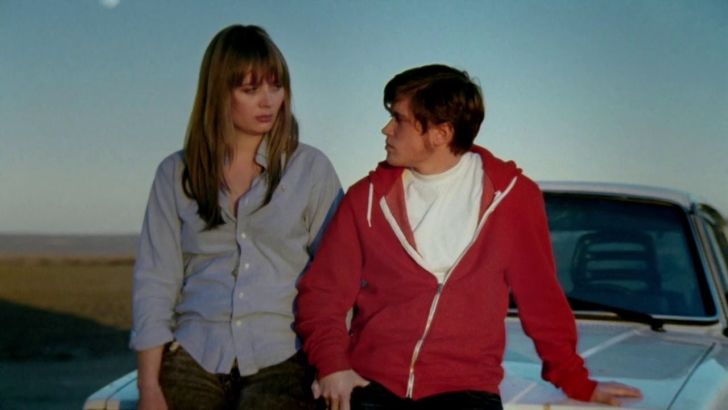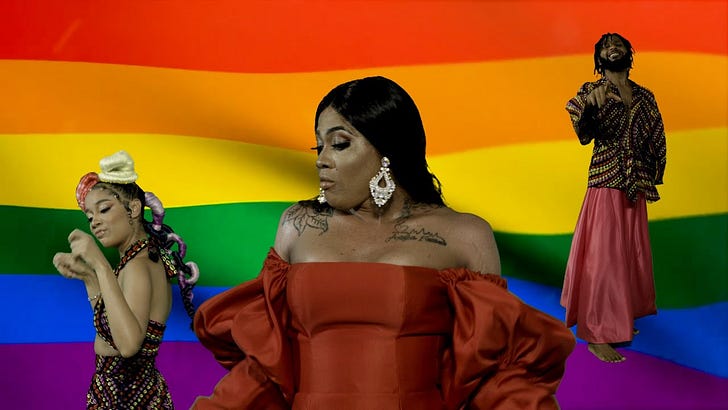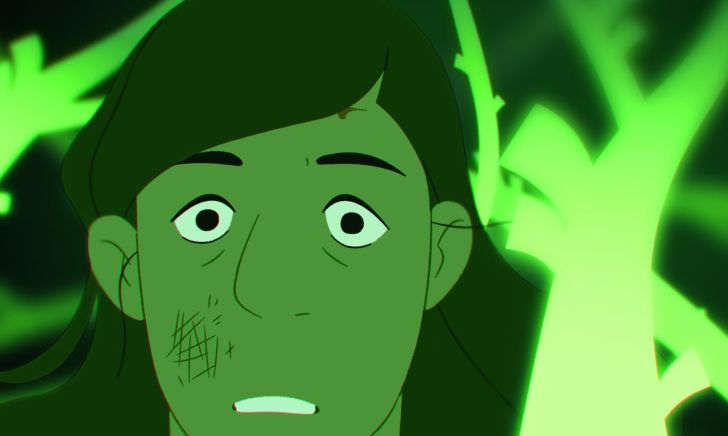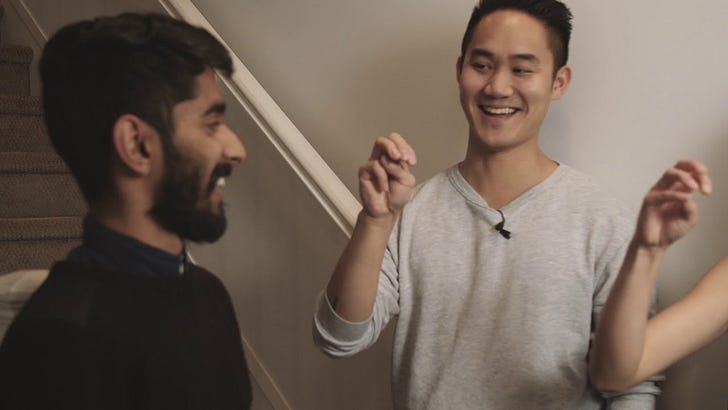Seven queer and trans short films are dancing in diaspora
I unexpectedly took a couple-months break, but queer short cuts is officially back! And just in time, because mid-October will be the one year anniversary of this newsletter. Even though I’ve switched to a biweekly schedule now, you can still expect plenty of queer short film recommendations in the next year as well.
We’ve previously had a week of diaspora-themed films, and another of films about dance classes, but this week they’re coming together! Dance and movement can be powerful ways to be in relationship with our cultures, ethnicities, and communities – but dance can also be a space where gender, sexuality, race, and caste are heavily policed, and where cisheteropatriarchal and colonial norms are strengthened and hardened. This week’s films feature performers who have used dance to rewrite their own stories and the stories of their ancestors, creating their own forms of freedom and connection to their homelands and themselves.
Pronouns are listed in the film descriptions for people who have made them explicitly available; for others, I try to infer pronouns from how other people talk about them but default to using just their names if I’m not sure.
“I miss dancing as much as I miss home.”
Day and Night, created by Nix Guirre (she/they), is about Nix’s rediscovery of Filipino dance as part of their way of connecting with her home. After growing up learning Spanish-influenced dances in the Philippines, Nix moved to the United States and fell out of touch with dance, even as the tensions of colonialism, oppression, and homesickness made her want that connection more and more. They connect with fellow Pinoy dancer Kim Requesto, who teaches her pangalay, a folk dance of the Tausūg and Bajau people of the Philippines, creating a dance offering for Nix to share, set to a cover of “Araw Gabi”, a song written by Ryan Cayabyab but made famous in the Philippines by pop star Regine Velasquez, performed here by Rachel Lastimosa.
Nix themselves is a documentary filmmaker and cultural worker based in the United States, who has worked as a labor organizer for Unite Here Local 2, the hospitality workers’ labor union, and now works with San Francisco’s Filipino Heritage Cultural District. This film was created as part of the Beyond Status workshop for independent migrant filmmakers, created by the Center for Cultural Power, a woman of color, artist-led organization in Oakland, California.
Day and Night
“When I started dancing, I felt the most permanent side of me just came out.”
The Shimmering Extraordinary: Hayaat Zahra, directed by Fx Goby, features British-Pakistani dancer Hayaat Zahra Shah telling the story of her relationship with kathak, a style of South Asian classical dance whose name comes from the Sanskrit word for “story”. Kathak originated in the Indian state of Uttar Pradesh, but it is also frequently practiced by Muslim South Asians, so kathak is also performed in Pakistan. Shah, who is trans and intersex, grew up in Manchester in the United Kingdom, where dancing was one of the outlets that let her express herself. When she came out as trans, Shah faced rejection from her family, and turned to dancing kathak as a point of connection to herself and others.
The film was created for The Shimmering Extraordinary, a series of short dance films commissioned by Scottish Ballet and produced by Nexus Studios. “Dance is this universal language that allows those without a voice to communicate through their body with others,” said director Fx Goby to Nowness. “It is a broad form of communication that bridges people together, from street dance to ballet. Dance is a safe place, a place where anyone can be themselves, whatever the style, whoever they are. It’s also a highly emotional medium for whoever watches it.”
The Shimmering Extraordinary: Hayaat Zahra
Aje Ijo Series: Immortal, created by Kiana Harris (she/her), features Black queer dancers performing in the outdoors, which begins by cutting between individuals dancing on their own and interacting with forests and water, then weaving in scenes of groups. The dreamy, powerful score by Mark Anthony Chubb is complemented by a range of movement styles, emphasizing pain, joy, despair, disconnection, and community alternately.
The film is part of the Aje Ijo Series which, according to the film description, “centers the humanity, resiliency, vulnerability of black & african diasporic people [of all genders], interrogating the western gender binary and interrupting accompanying notions of masculinity and femininity. Our individual and collective complexity, survival, thriving, and ultimately our healing as a people are at stake, and compel the elaboration of this narrative. To this end, the film elicits elements of spiritual cosmologies of the african diaspora, particularly those that emerge from the Yoruba divine consciousness, Ifa, and the Orisa (deities) that comprise it.”
“Immortal, the fourth and final installment [of the Aje Ijo Series], is a representation of Olodumare deity. This just means the keeper of no active sexuality, non-binary, and the creator of the world,” creator Kiana Harris told the San Diego Union-Tribune in an interview. “I created this series based on using the imagery from African history of Yoruba tradition, to present a range of gender expressions. I wanted to challenge the rigid gender binary of the patriarchy, so this was one of the reasons as to why I created all of these installments.”
Harris also noted, “[A]s Black folks, I think a lot of times we don’t know our history before colonization. I know I used to be one of those Black folks. Don’t get me wrong, there are lots of us who are studying and learning our history, but there’s also that group that doesn’t know about Yoruba faith and doesn’t know that Africans used to practice that, and doesn’t know that there are a range of gender expressions that happen in Yoruba faith. This was also my way to come to terms with being queer and my lifestyle being queer.”
Aje Ijo Series: Immortal
“When I first saw it, I was obsessed with leading. I wanted to have the choice to say ‘I want to lead this dance’ or ‘I want to follow this dance’.”
Queer Salsa: How One Nonbinary Couple Leads and Follows, a docu-short by KQED Arts, features salsa dancers and couple Audrey Guerrero (she/he/they) and Angie Egea (she/they), known as the “the Kueen & Queen of Non-Binary Afro Latin Dance” in Austin, Texas in the United States. Guerrero, who grew up in the Dominican Republic, and Egea, who is from Colombia, describe the history of salsa as originating in the Afro-Cuban community, which then was brought to the United States by immigrants and influenced by Puerto Rican, Mexican, Colombian, and other Caribbean dance traditions as well.
Guerrero and Egea met in Boston, and after getting together both as dance partners and as a couple, they moved to Austin and opened up the Oro Dance Company. They teach salsa and other dance styles, where they work to break down traditional gender roles of leading and following, not only creating queer dance community but also queering salsa itself through their own style of interchanging roles within a dance. They dance in competitions and festivals as well, where they end each performance with not only a bow, but a kiss.
Queer Salsa: How One Nonbinary Couple Leads and Follows
“I don’t want to do dance if it’s not allowing myself to honor that I’m queer and trans, because I have a queer and trans body, so I can’t separate that from my dance.”
Queering Movements, created by Ceci Sheng, Rino Kodama (they/them), and Yen Dinh, features Spun, a queer and trans nonbinary performer who grew up learning kuchipudi, a form of classical dance from Andhra Pradesh in India, where their family originated before moving to the United States. Kuchipudi was a site of pain and harm for Spun when they were a child, simultaneously because of abusive family dynamics that forced them into dancing, kuchipudi’s origins as a religious dance often performed at Hindu temples, and the very gendered structures of kuchipudi. But after separating from their bio family, they found fellow queer and trans South Asian American dancers with whom they have created their own form of dance that disrupts the patriarchal, transphobic, casteist, sex-negative elements within South Asian classical dance.
The three creators, who originally made the docu-short for a college ethno-communications class, also found meaning in Spun’s story. “We banded together because all of us are gay and trans and the rest of the class was mostly straight, so we really wanted to focus on the identity that we had in common,” Yen Dinh told their college newspaper, the Daily Bruin. “The dances embrace eroticism in their narratives and music, and they refer to different deities and their ancestors,” Rino Kodama added. “I was really moved when I first saw that performance live. It’s pretty rare to see just specifically Black and brown queer and trans performers.”
Queering Movements
“I am fragile too.”
Tajabone, created by Nicolas Huchard and co-directed by Raphael Chatelain, is named after a Senegalese tradition that takes place ten days after Tamkharit (Islamic New Year), where men and boys dress as women, and women and girls dress as men, before singing and dancing in the streets together. This short film, created for Nowness’s Just Dance series, draws from and celebrates the Black queer community in France, featuring dancers who vogue and buck together on a beach, set to a powerful poem about Black queer vulnerability and strength, written and performed by musician and writer Mykki Blanco.
Creator Nicolas Huchard, a dancer, choreographer, and movement director whose parents are Senegalese and Cape Verdean, grew up in France but visited Dakar every summer. “There was a lot of dancing at home. My father was a music buff who made his own mixtapes,” Huchard told Nataal Magazine. Huchard reached out to director Raphael Chatelain to create Tajabone, which they describe as “a direction of movement with tribal connotations, putting forward the notion of communication through the body.”
Tajabone
“A Bharatanatyam dancer is agile, graceful, balanced, and expressive.”
Beast, written and directed by Urvashi Pathania (she/her), is about Rani (Meghana Murthy), an Indian-American teenager who balances working at the family salon with dancing bharatanatyam, a form of Indian classical dance that originated in Tamil Nadu but is practiced throughout India. Rani’s family and community support Rani’s dancing, and are cheerful about their (incorrect) presumption that Rani is lesbian, but they reinforce gendered and colorist norms around beauty and presentation that Rani battles internally, those “lessons” echoing through Rani’s head all day before Rani has an important audition. But at the audition, the simple question of “Pronouns?” by the judges sparks a questioning and discovery for Rani that comes out in Rani’s dancing as well.
Creator Urvashi Pathania, who immigrated to the United States from India as a child, makes films that explore gender, sexuality, decolonization, and cultural bereavement. “[Beast] shows you a day in the life of a teenager and all of the voices they hear trying to tell them this is what they should do and how overwhelming it can be,” Pathania told Variety. “I hope it communicates what life is like for someone who is nonbinary, questioning what their gender might be.”
Beast










